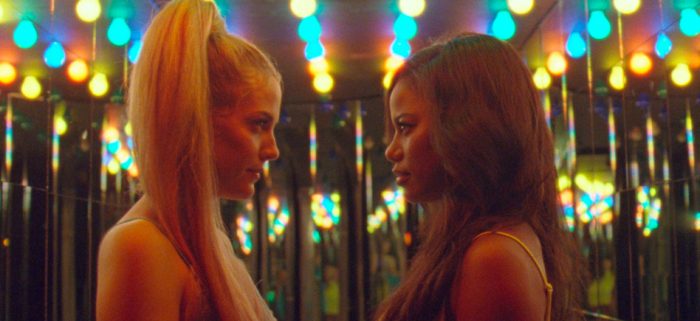In 2015, A’Ziah “Zola” King launched a Twitter thread that began with a question: “Y’all wanna hear a story about why me & this bitch here fell out? It’s kind of long but full of suspense.” Thus began a 100+ Tweet thread journey that went viral and chronicled a wild and crazy 48 hours involving stripping, sex trafficking, kidnapping, violence, and attempted suicide. It was too good to be true – but it was true. Well…some of it. Zola embellished several details, but Rolling Stone reporter David Kushner caught up with her – and the other characters in her tale – and was able to confirm much of it. It was only a matter of time before Hollywood came calling.
That brings us to Zola, a gonzo road trip movie that plays like a fever dream had by a sentient social media platform. It’s crass, it’s cruel, it’s wild, it’s often hilariously funny. Director and co-writer Janicza Bravo takes the majority of Zola’s Tweets and works them into a straightforward, though jarring, narrative. Like Zola herself, Zola the movie takes some liberties with the truth – names are changed, and some events here just flat-out didn’t happen. But the spirit of that viral thread remains intact. And what a gonzo spirit it is.
Existing somewhere on the outskirts of Fear and Loathing in Las Vegas, Hustlers, Spring Breakers, and The Florida Project, Zola wants to be the go-to movie for people who watch movies on their phones. It’s so obsessed with capturing the feeling of an internet aesthetic that you start to wish it would ease up a bit. For instance: to keep reminding us that this entire movie is based on a Twitter thread, Bravo fills the entire movie with Twitter sound effects – and boy does that get real, old, real fast. There is one decision that works particularly well, though: rather than have the bubbles from text messages pop-up on the screen, Bravo instead has her cast simply read them out loud, and maintain the parlance, so that characters are literally saying things like “IDK” and “Heart Emoji”.
Zola kicks off with a chance encounter. Hooters waitress and stripper Zola (Taylour Paige) waits on Stefani (Riley Keough), another dancer who seems immediately smitten. Zola seems to feel the same, and there’s a spark between the two women that leads them to immediately share phone numbers and social media handles. Zola doesn’t think too much about it, but the very next day she gets a text from Stefani inviting her on a trip to Florida. The plan: they’ll hit up some clubs and make a ton of cash. Zola is game – and it’s a decision she’ll quickly come to regret.
Also along for the ride are Stefani’s sad-sack boyfriend Derrek (Nicholas Braun), and Stefani’s roommate (Colman Domingo), a charismatic but mysterious man who doesn’t even give his name when Zola first meets him. It’s all fun and games – at first. Everyone looks to be having a good time, but the journey takes a dark turn, starting first with Derrek being dropped off at a seedy motel, and then with Zola getting roped into tricking (or trapping, as she calls it) via a Backpage ad set up by Stefani’s “roommate”, who turns out to really be her pimp, named X.
It’s the performances that keep Zola afloat. Keough can play this type of gum-snapping, slang-slinging character in her sleep, and she’s quite funny as the babyish Stefani, who isn’t as clueless and innocent as she makes herself out to be. But this is Paige’s show. As Zola, Paige’s comic timing is electric, and she brings a much-needed amount of sympathy and empathy to the proceedings. If this movie doesn’t make her a huge star, something is seriously wrong.
Bravo’s direction is snazzy and snappy – quick cuts, hilarious montages (like one involving the many, many men Stefani sleeps with, and their many, many penises), and a magnificent understanding of how to use sound to its full effect – witness a scene that’s “scored” to the beat of kids bouncing a basketball. But Zola also suffers from severe pacing problems. There are multiple long, pointless, and flat-out ugly shots of the back of a car driving down a road. The camera hangs far back, but the shots linger, for no good reason. Moments like this grind the flow of Zola to a halt, and a little trimming here and there would’ve gone a long way.
Zola needs to walk a fine line here. It’s dealing with some weighty subject matter, with sex trafficking being at the forefront of the story. Multiple scenes find Zola threatened with violence by X, and she feels like she can’t escape the situation. Yet the movie also wants to be funny, and it is. The narration, pulled from Zola’s Tweets but spruced up a bit, garners big laughs. But the juggling between twisted comedy and unrelenting bleakness starts to drag Zola down, to the point where you can’t help wonder why you’re bothering to follow any of these characters.
If Zola ends up being as buzzy as it’s clearly designed to be, we could be entering a whole new world where more and more social media threads get snapped-up to be turned into neon-drenched flicks loaded with phone sound effects. It’s up to you to decide whether or not that’s a good thing.
/Film Rating: 7.5 out of 10
The post ‘Zola’ Review: The Viral Twitter Thread Becomes a Gonzo Road-Trip Movie For the Internet Age [Sundance 2020] appeared first on /Film.

